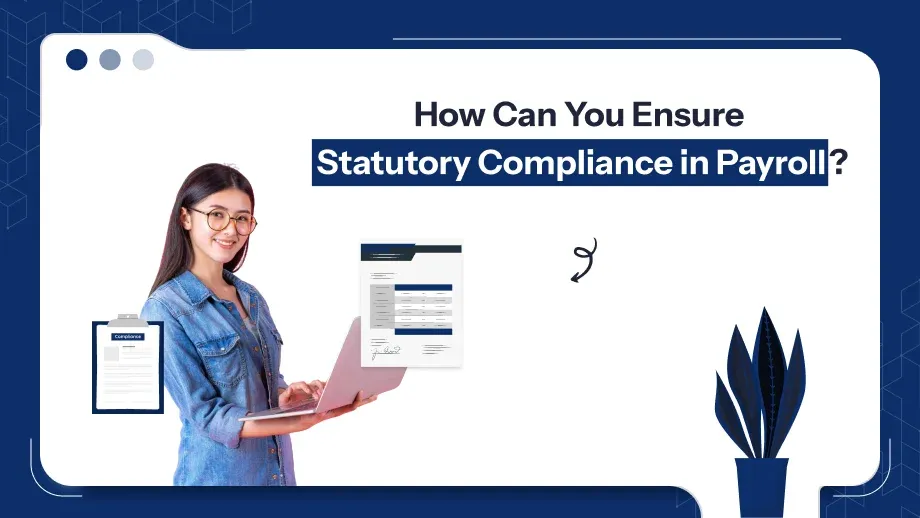
statutory compliance in payroll is crucial to the effective functioning of a firm. Failure to keep up with applicable laws may result in severe penalties, legal issues, and brand damage to your business. What does payroll statutory compliance include, and by what means can you make sure your company remains compliant with the law?
In order to assist the business you own run efficiently and legally, this piece of writing will address these queries and offer helpful suggestions for how to handle payroll and compliance service.
What Is Statutory Compliance in Payroll?
For starters, let’s define statutory compliance. Statutory compliance means the legal requirements a business must meet with respect to the payment of employees’ wages, tax, benefits, and other similar things in a place of employment.
During payroll, statutory compliance ensures that your practices according to your payroll are up to the norms of the government, which might include taxes withheld from workers’ paychecks, contributions for social security, insurance for workers, and so forth.
Every business, big or small and irrespective of industry, is always bound by various labor and financial laws, with regard to the statutory compliance for payroll regulations. It goes on to add the many kinds of penalties a company can receive along with serious legal issues it could be burdened with for violating such acts as minimum wage, tax, and benefit policies.
Payroll Compliance Requirements End
Location, industry, and number of employees are the general requirements that change the statutory compliance in payroll. The general basic requirements usually involve the following elements:
Tax Withholdings and Filings
Correct tax withholding is arguably one of the most important components of statutory compliance in payroll. The salary of the worker must have income taxes, contribution to social security, and Medicare taxes deducted. The corresponding agencies of government have to pay that amount. Failure to withhold and remit taxes correctly would attract significant penalties.
Provident Fund and Retirement Benefits
Many countries demand that employers make contributions to pension schemes for their employees, including a Provident Fund (PF). Since they reflect a portion of the worker’s pay, they aid in securing their financial future. The company is required to equal this amount with their own contribution to the funds in stead of removing it from the staff member’s pay.
Statutory Leave Entitlements
Employers are guaranteed monetary time off for maternity, annual, unwell, and holiday days because of legal leave rules. These leave entitlements are compulsory, and employers must track and manage them with accuracy.
Minimum Wage Compliance
Laws in a large number of nations establish a minimum wage that employers are required to pay to their employees. Regardless of the position or status, statutory compliance in payroll software guarantees employees get at least the stipulated wage.
Employee Benefits and Insurance
Employers are bound by law in a substantial number of jurisdictions to give their employees with services like health insurance, unemployment insurance, and salary insurance. Such advantages are incorporated in the usual legal requirements which businesses have to adhere to.
Record-Keeping
Payroll employers are mandated by law to keep all records of transactions regarding salary payments, tax deductions, and leave entitlements. Such records can be requested during an audit, and failure to maintain them could attract legal repercussions.
Ensure full statutory compliance in payroll with expert solutions.
Get in touch now to discover how our compliance services can help!
Why Statutory Compliance in Payroll is Essential for Your Business?
Not only is it about refraining from penalties, it involves numerous salient benefits to protect your business and contribute it to its success.
Assurance over Legal and Financial Penalties
Significant fees and other financial consequences may be imposed for breaking the law. Furthermore, it has an economic impact on the business you run, so you follow the rules to protect the payroll procedure from audits, monetary penalties, and legal proceedings..
Improving Trust among Employees
If an organization complies with statutory payroll laws, then such an organization ensures that there is fair treatment of the employees. This improves trust and makes workers confident in staying back. Such an organization will yield higher employee retention bonus and increased productivity.
Enhancing Business Reputation
An organization offering statutory compliance in payroll says that they follow best practices. This may enhance your business reputation, making you even more appealing to prospective clients, partners, and even employees.
Minimize Fraud and Error Risks
Payroll compliance reduces the risks of errors, fraud, or misunderstandings on employee compensation. An organized payroll system helps to avoid such risks.
Steps for Statutory Compliance in Payroll
So, how do you ensure that your business meets statutory compliance requirements in payroll? Here are some of the key steps that will guide you through compliance and avoid common pitfalls.
Stay Current on Applicable Statutes and Rules
Probably one of the hardest payroll statutory compliance tasks is keeping abreast of the fluid changes happening within tax codes, labor laws, and employee benefits. Laws often change so fast; it is advisable to stay updated through government newsletters, industry webinars, or legal and tax experts who alert you on updates.
Have an Integrated Payroll System
Statutory compliance in payroll requires having a strong system for payroll processing. This aspect allows the computation of taxes deducted and leaves computed among others while making payslip generation automatic, and most services help reduce potential human error chances with accurate filling, benefit contribution, and leaving accrual recording.
Outsourcing the payroll to a Statutory compliance services
One of the best ways to ensure payroll compliance in payroll helps to outsource payroll management to statutory compliance services. These third-party providers have expertise in payroll-related tasks and keep your business abreast of laws and regulations updated. With outsourcing, you can liberate much time to pursue business growth while letting experts deal with the complexity of compliance.
Statutory compliance services not only take care of payroll calculations and deductions but also handle statutory reporting and filing. This means that your business is in complete government compliance, making it less painful to manage the payroll and reduces the possibility of errors or delay.
Clear Payroll Process
A structured payroll system is fundamental compliance. Payrolls should have precise timelines of operations, clean, accurate data related to the employee, and sound records of each transaction. Verify that your system has checks and balances regarding any calculation or contribution and its appropriateness with regard to employees before effecting payment.
Train your HR and Payroll staff
Internal payroll management calls for constant training for your payroll team; this will be crucial since the employees are more and more expected to be well up-to-date with statutory compliance in payroll helps to minimize errors and ensure compliance. Regular workshops, training sessions, or certifications in payroll management can keep your team in the information about the statutory changes.
Regular Audit of Your Payroll System
It is essential to ensure your payroll system stays compliant by scheduled audits. Such audits can flag gaps in the payroll process or where statutory compliance in payroll has slipped over time. Internal and external audits can help you spot problems and fix them before it becomes expensive mistakes.
Retain Accurate Records and Documentation
Keeping thorough and accurate payroll records is crucial to proving compliance. Wage, tax deduction, benefit, and leave data are each included in this. These records can be required for legal or tax auditing needs. Ensure that you keep both electronic and paper records for the legally required duration.
Benefits of Statutory Compliance Services
While small firms may handle their payroll oneself, many still choose to hire statutory compliance in payroll providers to simplify their tasks and guarantee legal compliance. The main advantages of employing statutory compliance in payroll services are outlined below:
Expertise and Experience
Providers of services for statutory compliance bring years of experience and knowledge to the room. No matter where you operate, your company will remain legal because it has a comprehensive understanding of the local rules and laws.
Time and Cost Savings
Payroll Outsourcing helps businesses save valuable time and reduce administrative costs. Your in-house staff can focus on core business activities while the payroll service provider handles all compliance-related tasks.
Risk Mitigation
Outsourcing payroll operations significantly decreases the risk of failure to comply, consequences, and fines. Statutory compliance services ensure that your company stays in good standing with the authorities by managing all facets of payroll administration, including taxes, benefits, and statutory contributions.
Scalability
The complex nature of payroll administration increases with the size of the organization you work for. Whenever your workforce grows, statutory compliance in payroll services may readily grow with your company, ensure that your payroll procedures stay successful and legal.
Conclusion
For every business, making sure payroll complies with the law is key. Building a foundation of confidence with employees, upholding an excellent corporate image, and guaranteeing uninterrupted operations are more important than just avoiding fines.
Businesses may successfully negotiate the challenges of managing payroll by keeping up with statutory compliance requirements, putting in place an effective payroll system, and taking into consideration statutory compliance services.
Payroll compliance would always be a must, no mater whether you handle it yourself or contract it out. By considering the best practice that has been outlined in the blog, ensuring that your company remains compliant should minimize risks.









